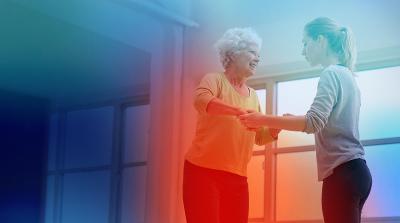Master of Science in Kinesiology
The Kinesiology graduate program offers graduate study and research leading to a Master of Science degree in three major areas of specialization.
This degree program is designed for the in-depth study of a particular field. It is possible for a full-time student to complete this degree program in one academic year plus one summer session. Most students complete the degree in 2 years.
Areas of Study
Cultural, Interpretive and Science Studies
Drawing on theories and methodologies of sciences, arts, and humanities; studies and creates knowledge related to physical culture, health, and the human body.
Exercise Physiology
Examines work output, energy transfer, and movement efficiency. Research in this area strives to better understand the consequences of exercise stress on body systems.
Exercise Psychology
Faculty in the Exercise Psychology group examine the psychological antecedents (e.g., motivation, personality) and consequences (e.g., mental health, cognitive function) of involvement in physical activity and exercise.
Motor Control / Biomechanics
Examines the neural, physiological and behavioral aspects of the control of movement across the lifespan and in health and disease.
Pedagogy & Physical Activity
Examines how knowledge and skills are imparted in an academic context, focusing on curricula and instruction that helps individuals develop knowledge, skills, and confidence needed to adopt and maintain a physically active lifestyle
Admissions Requirements
- Baccalaureate degree from an accredited institution of higher education
- A minimum grade-point average of 3.0 (A=4.0) for the last 60 hours of undergraduate work and any graduate work completed
-
Although the GRE scores are not required, the scores may provide helpful supporting information in some cases. Applicants who have taken the GRE and feel their scores would benefit their application are encouraged to submit the scores. If you would like to submit scores, we recommend you scan your official score report as a PDF file and attach it to your application. You do not need to submit official scores through ETS, but if you decide to, please use our University code of 1836.
Your application must demonstrate sufficient academic/quantitative preparedness to be considered for admission to the program. Your prior coursework, volunteer and/or work experiences, and recommendations are just a few of the items that will be reviewed to gauge your preparedness for graduate studies.
- 3 Letters of Recommendation
- Personal Statement
- Resume
- Official Transcripts
- International students must also submit Test of English as a Foreign Language scores, with a minimum for full status admission: 103 (TOEFL - IBT) or 7.5 (IELTS). Scores cannot be more than 2 years old. Please see more information about the DUPLINGO test here.
- Students for whom English is not their native language and who wish to be considered for a teaching assistantship must achieve a score on the speaking sub-section of 24 (TOEFL - IBT) or 8 (IELTS). See this page for details.
Admission Deadlines
Students may apply to either the M.S. or the Ph.D. program. Applications for Fall admission are due on January 15. Applications for Spring semester are due on October 1.
Degree Requirements
- Candidates for this degree must complete a minimum of 32 hours, 16 of which must be completed in Kinesiology.
- 8 hours must come from the identified major area of study, and 4 hours must be taken from one additional area of study in the department.
- 12 of the total hours must include 500-level courses.
- Of the 16 hours in Kinesiology, Kinesiology 501 (Research Methods in Kinesiology) or an equivalent graduate-level research methods course appropriate to a student’s program of study is required.
- No more than 8 hours of graduate credit from another institution may be substituted.
- A student may choose to write an acceptable thesis for 8 hours of credit (i.e., Kinesiology 599) or select a non-thesis option by substituting 8 hours of credit (i.e., approved credit that includes at least 4 hours of Kinesiology 590 Independent Study).
Curriculum
Thesis Option
| Code | Course |
|---|---|
| KIN 501 |
Kinesiology Research Methods
Hours: 4 |
| KIN 591 |
Seminar
Hours: 4 |
|
MajorArea of study courses
Hours: 8 |
|
|
Secondary area of study within dept.
Hours: 4 |
|
|
Research/project hours
Hours: 0-8 |
|
| KIN 599 |
Thesis Research
Hours: 8 |
Total Hours: 32
Non-Thesis Option
| Code | Course |
|---|---|
| Kin 501 |
Kinesiology Research Methods
Hours: 4 |
| KIN 591 |
Seminar
Hours: 4 |
|
Major area of study courses
Hours: 8 |
|
|
Secondary area of study within department
Hours: 4 |
|
|
Research/project hours
Hours: 4-8 |
Total Hours: 32
Other Requirements
Other requirements may overlap
Minimum Hours Overall Required Within the Unit: 20 Credit Hours (not including 599)
Minimum 500-level Hours Required Overall: 12 Credit Hours
Minimum GPA: 3.0
Work with Julie Jenkins or Dr. Laura Rice to best customize your course schedule.
For more information reference the course catalog.
Apply Now
Follow the link below to follow begin your application.
Request more information
Julie Jenkins
Administrative Aide
jjenkns@illinois.edu
Phone: (217) 333-1083
Dr. Laura Rice
Director Graduate Studies
ricela@illinois.edu

